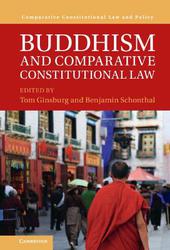
|
Buddhism and Comparative Constitutional Law
Hardback
Main Details
| Title |
Buddhism and Comparative Constitutional Law
|
| Authors and Contributors |
Edited by Tom Ginsburg
|
|
Edited by Benjamin Schonthal
|
| Series | Comparative Constitutional Law and Policy |
|---|
| Physical Properties |
| Format:Hardback | | Pages:300 | | Dimensions(mm): Height 229,Width 152 |
|
| Category/Genre | Buddhism |
|---|
| ISBN/Barcode |
9781009286046
|
| Classifications | Dewey:342.5 |
|---|
| Audience | |
|---|
| Illustrations |
Worked examples or Exercises; Worked examples or Exercises
|
|
Publishing Details |
| Publisher |
Cambridge University Press
|
| Imprint |
Cambridge University Press
|
| Publication Date |
1 December 2022 |
| Publication Country |
United Kingdom
|
Description
Buddhism and Comparative Constitutional Law offers the first comprehensive account of the entanglements of Buddhism and constitutional law in Sri Lanka, Myanmar, Thailand, Cambodia, Vietnam, Tibet, Bhutan, China, Mongolia, Korea, and Japan. Bringing together an interdisciplinary team of experts, the volume offers a complex portrait of "the Buddhist-constitutional complex," demonstrating the intricate and powerful ways in which Buddhist and constitutional ideas merged, interacted and co-evolved. The authors also highlight the important ways in which Buddhist actors have (re)conceived Western liberal ideals such as constitutionalism, rule of law, and secularism. Available Open Access on Cambridge Core, this trans-disciplinary volume is written to be accessible to a non-specialist audience.
Author Biography
Tom Ginsburg is the Leo Spitz Professor of International Law at the University of Chicago and a Research Professor at the American Bar Foundation. Benjamin Schonthal is Professor of Buddhist Studies and Head of the Religion Programme at the University of Otago, where he also Co-directs the Otago Centre for Law and Society.
Reviews'This comprehensive collection brings together a stimulating selection of case studies from experts on Buddhism, law, and constitutions. Its multi-disciplinary perspective raises much needed comparative questions about the relations between Buddhist ideas and constitutional principles. Ultimately, the editors ask what Buddhism is and what forms the Buddhist-constitutional complex, which they put at the heart of this excellent volume.' Fernanda Pirie, University of Oxford 'Schonthal and Ginsburg have pioneered a new field of Buddhism and comparative constitutional law. They bring substantial mastery of Buddhism and law to the book. The volume contains an impressive breadth of socio-legal scholarship. This innovative collection showcases the next generation of scholars in the study of Buddhism and law.' Melissa Crouch, University of New South Wales 'By exploring the 'Buddhist-constitutional complex' in which constitutionalism and Buddhism may mutually shape and be shaped, this inspiring volume opens up a new field for scholars of comparative constitutional laws and religious studies, not only in Asia but also in the West.' Wen-Chen Chang, National Taiwan University College of Law 'This rich and deeply interesting collection provides further evidence that scholars of Buddhism and law are now producing some of the most exciting new scholarship in the law and society field. Even the most skeptical reader will be persuaded that the topics of Buddhism and constitutionalism can indeed be considered in tandem - a fact that was previously far from obvious - and that neither can be understood in Buddhist cultures without taking full account of the other. This book sheds new light on longstanding scholarly assumptions about governance, legitimation, political and social order, and the sacred authority of rulers. It opens up a broad new field for future research that could fundamentally change our understandings of the role of law among the Buddhist peoples of Asia.' David M. Engel, School of Law, State University of New York at Buffalo
|